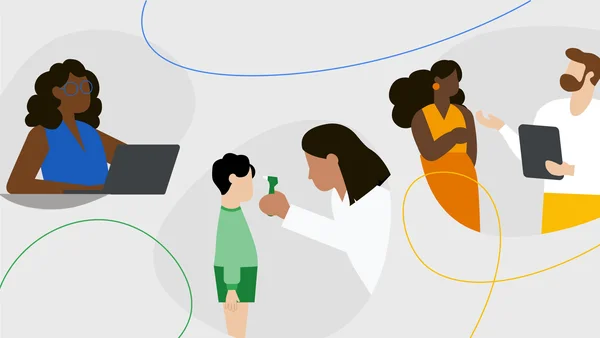Women around the world have had to change their lives in unpredictable ways. Despite the challenges of the pandemic, political restrictions and global conflict, their resilience has been remarkable. Women have continued to show up for themselves, their families and their communities — and it’s why on this International Women’s Day, and every day, Google is showing up to support them.
When I reflect upon the women who inspired me, I go back to my undergraduate education at Spelman College, a historically Black college for women in Atlanta. It was there I joined a sisterhood of women who looked like me and pushed me to strive for excellence. Today, as a physician and a director within Google Health, I cherish this support system more than ever. Throughout the pandemic, and thanks to technology, we’ve been there for each other through life's events, big and small — birthdays, loss of parents, encouragement on that Peloton ride, the list goes on. My connection with these women who are now lawyers, engineers, academic professors, executives at Fortune 100 companies, has been a lifeline because we are also mothers, daughters, sisters, aunts, life partners and friends. Google artist Thoka Maer, expresses this idea beautifully in our global, animated slideshow Doodle. Her Doodle illustrates the many roles we as women play, how we inspire those around us and how we continue to support each other when life forces us to suddenly adapt.
Supporting others means first supporting oneself, much like airlines tell you to put on your oxygen mask first before helping others. At Google, we’re working to help women prioritize their needs by putting a premium on safety and health, creating equitable opportunities and celebrating their accomplishments. This spirit of inclusivity and support extends to all who identify as women, recognizing the intersections of other identities, backgrounds and personal experiences. Join us as we bring people together from around the world for Google’s International Women's Day event series, starting today with our virtual Global Summit, followed by regionally focused events throughout the month of March. And read on to learn about all the ways we’re supporting women globally, not just today, but every day.
 As medical AI evolves, we unveil tools and resources to help identify and mitigate biases that could negatively impact health outcomes.
As medical AI evolves, we unveil tools and resources to help identify and mitigate biases that could negatively impact health outcomes.
 As medical AI evolves, we unveil tools and resources to help identify and mitigate biases that could negatively impact health outcomes.
As medical AI evolves, we unveil tools and resources to help identify and mitigate biases that could negatively impact health outcomes.
 Here are four key health equity elements to consider when building AI models so everyone, everywhere can live a healthier life.
Here are four key health equity elements to consider when building AI models so everyone, everywhere can live a healthier life.
 Researchers will receive Cloud credits, funding, Fitbit devices and Fitabase to support research to addresses critical health disparities
Researchers will receive Cloud credits, funding, Fitbit devices and Fitabase to support research to addresses critical health disparities


